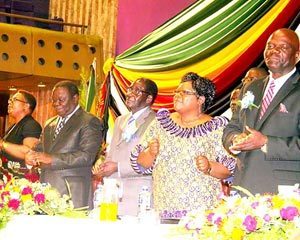
Uncertainty over what will happen after last week’s Copac second All-Stakeholders’ Conference is a sign that the constitution-making process is doomed to fail if the Global Political Agreement (GPA) principals continue to drive the process, analysts have warned. Report by Patrice Makova
The two-day stakeholder’s conference failed to come up with any concrete decision, with President Robert Mugabe insisting that the GPA principals and not Copac had “final say” on the draft constitution before it goes for a referendum.
Zanu PF submitted a host of amendments which it wants incorporated into the draft, but the two MDC formations refused to budge.
They maintained that all the three parties to the GPA have already appended their signatures to the compromise document.
Copac co-chairperson, Paul Mangwana, said a technical team was compiling a report on the conference before the draft is debated in Parliament.
But National Constitutional Assembly (NCA) chairman Professor Lovemore Madhuku said Mugabe’s pronouncement at the stakeholder’s conference spelt doom for the process and proved that the draft was no longer a Copac document, but that of the three principals.
He said the 25 parliamentarians selected to drive the Copac process in line with the GPA were powerless because the principals were using their political muscle to hijack the process.
“This constitution-making process, which is being driven by politicians, is not going to produce a democratic constitution and that is why the NCA is mobilising for a no vote,” said Madhuku.
- Chamisa under fire over US$120K donation
- Mavhunga puts DeMbare into Chibuku quarterfinals
- Pension funds bet on Cabora Bassa oilfields
- Councils defy govt fire tender directive
Keep Reading
He said the stakeholder’s conference was supposed to be a platform to dialogue and come up with resolutions, but the political parties involved would have none of this.
“What is the purpose of meeting to just make comments with no concrete resolutions?” Madhuku asked.
“They should have asked people to send their views via text or email messages instead of wasting a lot of money on a huge and useless conference.”
He said the estimated US$2 million which was spend on the stakeholders’ conference could have been used to buy much needed CD4 count machines and life-saving dialysis equipment.
Irene Petras of the Independent Constitution Monitoring Project (ICMP) said the conference ended without clarity as to the immediate steps that will be taken to finalise the draft.
“It is critical for Copac to provide clarity in this regard so as to reduce tensions and opportunities for political manipulation,” she said.
“Mindful of the provision in Article VI of the GPA, that the constitution-making process is not a political process, but a process for citizens of Zimbabwe. we appeal to Copac to increase confidence-building measures in the process and publicly outline the roadmap that should finally lead to a referendum.”
Petras urged the executive to refrain from interfering in the process and ensure that they strictly comply with provisions of Article VI.
She said it was now up to Zimbabweans to decide on the acceptability of a governance charter that will emanate from this process through the referendum.
But Zanu PF’s Copac technical advisor, Godwills Masimirembwa, told a Mass Public Opinion Institute meeting last week that there was nothing wrong in the Executive, particularly the principals, stamping their authority.
He said to prove that constitution-making was purely a political process, Copac was reporting to a management committee handpicked by the parties and not to the Speaker of Parliament.
“It was this management committee which okayed the draft before giving it to the principals,” said Masimirembwa.
“The executive dominates other arms of the government. This is why you see MP’s being whipped into line by being told it’s not what you think, but what we want.”
Ellen Dingani of the ICMP, said it was necessary for both political parties and the broad civil society to disentangle themselves and understand their roles as the constitution-making process continues.
“Failing which they will continue to do a disservice to the broader population who have issues which may be peripheral to objectives and priorities of the three political parties in the government,” she said.
The Independent Constitution Monitoring Project comprises the Zimbabwe Peace Project, Zimbabwe Election Support Network and Zimbabwe Lawyers for Human Rights.










